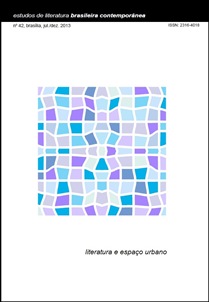Uma realidade que ficcionalizou a si mesma:
história e subjetividade em Vento sul, de Vilma Arêas
DOI:
https://doi.org/10.1590/S2316-40182013000200014Abstract
O artigo busca compreender como se dá a representação da realidade no livro Vento sul, de Vilma Arêas, a partir da indagação de procedimentos simétricos opostos de composição nele radicalizados: a desliterarização e o artifício poético-literário. Trata-se de apreender o teor da história e do sujeito que o livro configura, e de refletir sobre um veio da literatura brasileira contemporânea.
Downloads
References
ANDRADE, Carlos Drummond de (1992). Poesia e prosa. 6. ed. Rio de Janeiro: Aguilar.
ARANTES, Paulo (1996). Paradoxo do intelectual. In: Ressentimento da dialética. Rio de Janeiro: Paz e Terra.
ARÊAS, Vilma (2011). Vento sul. São Paulo: Companhia das Letras.
BENJAMIN, Walter (1993a). O surrealismo. O último instantâneo da inteligência europeia. In: Obras escolhidas I: magia e técnica, arte e política. 6. ed. São Paulo: Brasiliense.
________ (1993b). Sobre o conceito da história. In: Obras escolhidas I: magia e técnica, arte e política. 6. ed. São Paulo: Brasiliense.
CARONE, Modesto (1998). Resumo de Ana. São Paulo: Companhia das Letras.
JOGO de cena (2007). Direção: Eduardo Coutinho. Produção: Bia Almeida et al. Rio de Janeiro: Videofilmes. 1 DVD (100 min).
Downloads
Published
How to Cite
Issue
Section
License
Authors who publish in this journal agree to the following terms:
a) The authors maintain the copyright and grant the journal the right of first publication, the work being simultaneously licensed under the Creative Commons Attribution License-Non Commercial 4.0 which allows the sharing of the work with acknowledgment of the authorship of the work and publication this journal.
b) Authors are authorized to enter into additional contracts separately, for non-exclusive distribution of the version of the work published in this journal (eg publish in institutional repository or as a book chapter), with authorship recognition and publication in this journal.
c) Authors are allowed and encouraged to publish and distribute their work online (eg in institutional repositories or on their personal page) after the editorial process, as this can generate productive changes, as well as increase the impact and citation of published work (See The Effect of Free Access).
d) The authors of the approved works authorize the magazine to, after publication, transfer its content for reproduction in content crawlers, virtual libraries and the like.
e) The authors assume that the texts submitted to the publication are of their original creation, being fully responsible for their content in the event of possible opposition by third parties.


